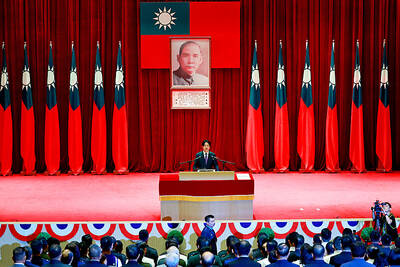China announced yesterday that Hong Kong's new No. 2 leader is Rafael Hui (許仕仁) -- a veteran civil servant who pledged to focus on economic development, creating jobs and making the government more efficient.
Hui, whose expertise is in financial affairs, takes over from Donald Tsang (曾蔭權), a popular career bureaucrat who last week assumed the title of chief executive -- the territory's highest political post.
As the chief secretary for administration, Hui will be responsible for overseeing the government's daily affairs.
Hui's widely expected appointment wraps up a leadership shake-up triggered in March when former chief executive Tung Chee-hwa (董建華) quit, citing fatigue and failing health.
Tsang said Hui was his choice and had submitted his name to China's central government last Saturday.
"I have worked with Mr. Hui for many years. I know him well. He has the insight, ability and commitment to serve the country and the Hong Kong people," Tsang told reporters.
In his first public comments since being named to the post, Hui pledged to work toward a better Hong Kong.
He said the "government will operate in a highly efficient manner, maintain a level playing field for business, spearhead economic development, increase job opportunities, enhance the standard of government services and make Hong Kong a better place for people to live and work."
In his short speech, Hui didn't touch on the sensitive issue of political reform. The government is considering ways to make Hong Kong more democratic, and Tsang was in charge of the initiative when he was the No.2 leader. Hui might take over the delicate task.

TPP RALLY: The clashes occurred near the Chiang Kai-shek Memorial Hall on Saturday at a rally to mark the anniversary of a raid on former TPP chairman Ko Wen-je People who clashed with police at a Taiwan People’s Party (TPP) rally in Taipei on Saturday would be referred to prosecutors for investigation, said the Ministry of the Interior, which oversees the National Police Agency. Taipei police had collected evidence of obstruction of public officials and coercion by “disorderly” demonstrators, as well as contraventions of the Assembly and Parade Act (集會遊行法), the ministry said in a statement on Sunday. It added that amid the “severe pushing and jostling” by some demonstrators, eight police officers were injured, including one who was sent to hospital after losing consciousness, allegedly due to heat stroke. The Taipei

NO LIVERPOOL TRIP: Taiwan’s Lin Yu-ting, who won a gold medal in the boxing at the Paris Olympics, was embroiled in controversy about her gender at that event Taiwanese boxer Lin Yu-ting (林郁婷) will not attend this year’s World Boxing Championships in Liverpool, England, due to a lack of response regarding her sex tests from the organizer, World Boxing. The national boxing association on Monday said that it had submitted all required tests to World Boxing, but had not received a response as of Monday, the departure day for the championships. It said the decision for Lin to skip the championships was made to protect its athletes, ensuring they would not travel to the UK without a guarantee of participation. Lin, who won a gold medal in the women’s 57kg boxing

The US has revoked Taiwan Semiconductor Manufacturing Co’s (TSMC, 台積電) authorization to freely ship essential gear to its main Chinese chipmaking base, potentially curtailing its production capabilities at that older-generation facility. American officials recently informed TSMC of their decision to end the Taiwanese chipmaker’s so-called validated end user (VEU) status for its Nanjing site. The action mirrors steps the US took to revoke VEU designations for China facilities owned by Samsung Electronics Co and SK Hynix Inc. The waivers are set to expire in about four months. “TSMC has received notification from the US Government that our VEU authorization for TSMC Nanjing

CHINESE INCURSIONS, SORTIES: President William Lai thanked military officers for shouldering the responsibility of defending the survival and development of Taiwan President William Lai (賴清德) yesterday said that aggression would inevitably fail, pointing — on the day before a mass military parade in Beijing — to the lessons from World War II and key victories Taiwan claims against Chinese forces in 1958. Taiwan has over the past five years repeatedly complained about heightened Chinese military activity including war games around the nation as Beijing steps up pressure to enforce territorial claims that Taipei rejects. Chinese President Xi Jinping (習近平), flanked by Russian President Vladimir Putin and North Korean leader Kim Jong-un, are to oversee a military parade in Beijing today to mark the